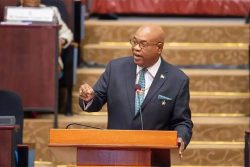Dear Editor,
The ‘A Partnership for National Unity’ (APNU) and ‘Alliance for Change’ coalition is comprised of multiple political parties which are made up of people from various ethnicities and professions. However, many have expressed their frustration about the multi-party coalition government, just as many had expressed frustration with the former PPP/C government prior to 2015, the year they were ousted from public office by a majority vote. The current issue, for many, is to decide which of the two frustrations they prefer to endure for another term.
On his blog, Dr. David Hinds wrote an article on July 7th titled ‘Despite its Shortcomings, the Coalition is the Better Choice’, declaring support for the
coalition party which he is a prominent member of as a representative of the Working People’s Alliance. He contends that they are the better choice of the two major parties. This is the politician-side of him talking. I suspect the academic figure he’s renowned as would encourage something more profound. But it should be noted that, contrary to Dr. Hinds’ position, the choice of determining who governs for another term isn’t limited between the two leading political parties. So, there are alternative campaigns to choose from. The question should be whose interest do each of them represent?
There are some of us who think that political parties will change the very soul of Guyanese politics to make it better and more democratic and inclusive than it is, and providing opportunities to the people unlike the generations of yesteryear who seem to be stuck in a time of ethnic rivalry. Others refer to the need for a third-party force that can help make this happen. The fact is that we did have a recent third-party force—the Alliance for Change—though it seems many have expressed disappointment by the actions and inactions of their tenure in the coalition government. But what’s interesting about the Alliance for Change during their run as an independent party is that they were able to gather about 10% of the total votes at the 2011 national elections. This indicates to me that 10% of the voting population is eager for genuine political change. The problem comes when it is time to define what sort of change is necessary. For example, is a multi-coalition government necessary for the sort of change we wish to see? Or is it just part of something more comprehensive required?
There are others who profess that a new generation should take the lead with a new party, but any aspiring young leader must be willing to endure an almost lifetime commitment to shaping the political landscape in their favour and be ready to face hostility and bitter backlash from the reigning groups. Consider the Alliance for Change: as an independent party it took them a decade to garner enough votes to have seats in Parliament to make an impact on political outcomes. Additionally, they must be dedicated to a lifelong education of politics in its original Greek sense—politikos—that is, simply put, arguing for state and people.
To those of us who aspire for meaningful political change, we must acknowledge that change must be treated as an ongoing project. Obviously, political change that is desirable doesn’t come overnight, and it certainly won’t come within the next decade. There are sociopolitical and historical reasons for this which justifies why much of the same cyclical politics will continue for at least, I dare say, another decade or two.
The key point I wish to highlight here is one which Walter Rodney recognized. In the documentary ‘In the Sky’s Wild Noise’ Rodney articulated, I quote, “I say this, very deliberately, not even those who stand on this platform can tell you that ‘the remedy in Guyana is that a new set of people must take over from the old set of people and we will run the system better’—that is no solution to the problems of Guyana. The problem is much more fundamental than that. So long as we suffer with a warped context of politics… we are going to be in a lot of trouble.”
I consider Rodney to mean that no political party can truly solve our problems. Ours is much deeper than that. Ours is one that requires community and understanding to counter the plague of ignorance that manifests itself at every tier of our society. More importantly, we must stop making enemies among ourselves. For a divided nation is no nation at all. What we don’t want to become is a skirmish people whose interest is solely to make ends meet. Lastly, we must envision what Rodney did in his young life as we look for a remedy to our social ills, that is, we must transcend our problems rather than ignore them.
Yours faithfully,
Ferlin F. Pedro








